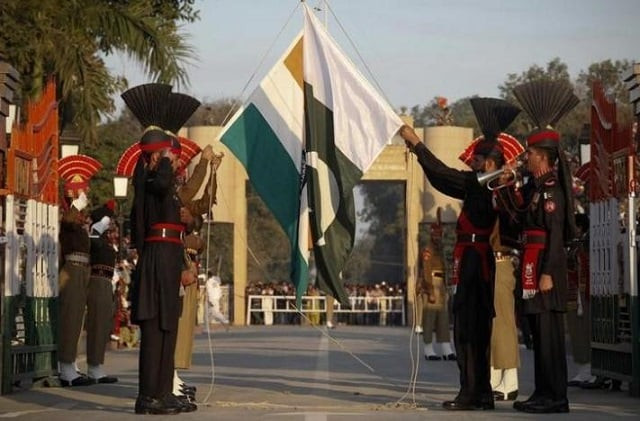Pakistan, India and Churchill’s Crocodile
The apprehension of Kulbhushan Jadhav is a great success for Pakistani counter-intelligence apparatus

Pakistan Rangers (R) and Indian Border Security Force personnel take part in the daily flag lowering ceremony at their joint border post of Wagah near Lahore PHOTO:REUTERS
The latest spat between the two states is a fascinating tale. The story begins when a serving Indian naval officer, a spy and saboteur is caught red-handed in Pakistan and sings like a canary when investigated about the terror, violence and murders he perpetrated in Pakistan. Indians in their trademark intransigence not only refused to accept the officer as a serving member of the armed forces, they also had the gall to promote an intellectually offending counter-narrative of their own that said he was kidnapped by Pakistan in Iran where he was conducting private business. Truth be told, the Indian narrative is rationally feeble and logically inconsistent, and no intelligence agency in the world worth its salt would buy it. To say that the Americans or the Chinese or the Russians do not know what the reality is would be a self-defeating assumption. That said, all countries would choose to comment, not comment, refute or endorse the conflicting narratives depending on their own vital interests. That’s realpolitik. In the real world truth matters, but little.
The apprehension of Kulbhushan Jadhav is a great success for Pakistani counter-intelligence apparatus. For the Indian intelligence agencies, it is a development of momentous catastrophe and a huge blow to their reputation. It has undone decades of Indian clandestine activities in Pakistan since Jadhav was no ordinary operative. A serving officer of the rank of ‘Commander’ in the Indian Navy, he was involved in planning, training, funding and execution of targeted killings, bomb blasts, provision of specialist naval combat training to sabotage and target naval facilities at Karachi and Gwadar ports, and fuelling insurgency by provision of funds and training to insurgents in Balochistan. His arrest triggered the quashing of a huge network of informants, operatives, funding and executioners working around him. This also provided Pakistani intelligence agencies with an invaluable insight into the methodology and working of their Indian equivalents. A man of Jadhav’s credentials would be hanged to death in any self-respecting country. No questions asked.
This, however, is Pakistan. The government seems to be bending backwards to appease the Indians with continuously docile diplomatic posturing. The deposed PM, Nawaz Sharif, could never muster the courage to even name the spy when presented with an opportunity to address the international audience. As the sitting PM of the country, he would have been presented with irrefutable evidence of Jadhav’s activities in Pakistan. Yet, the man chose to court his Indian counterpart in diplomatically unorthodox ways even at the cost of his own patriotic reputation. Any discerning mind would marvel at the scale of leverage the Indians might hold over Nawaz Sharif because this surely had little to do with overtures of peace.
The Indian approach towards Pakistan all this while has continuously congealed into an even harsher and thoroughly illogical stance. There are simple reasons for this mindset. One, status quo suits India. They would never sit for talks that might lead to altering of the current status whether in Kashmir, at the Line of Control or at any international forum. Two, a vitriolic stance of the Indian government towards Pakistan ensures brighter domestic politics for the Bharatiya Janata Party in a highly polarised society that India has become. Three, the age-old hegemonic philosophy inspired by Chanakya (Kautilya) is playing out quite well for now as feeble states all around India keep tumbling like dominoes to the strong arm tactics of coercion employed against them.
To see a grandly magnanimous gesture of allowing the kin of a self-confessed terrorist to meet him transformed into a war of petty words and worthless rhetoric by India is truly nauseating, especially when followed by unprovoked fire on the borders resulting in a wanton killing. The whole episode might mean that this becomes the last of such visits. When that happens, who would stop Jadhav’s mother from speaking out openly about how she was treated in Pakistan. A mother with her son on death row can be a challenge to buy for petty politics. Pakistani diplomacy, meanwhile, needs to halt its submissive posturing before Churchill’s proverbial crocodile crawls right up to its neck.
Published in The Express Tribune, December 30th, 2017.
Like Opinion & Editorial on Facebook, follow @ETOpEd on Twitter to receive all updates on all our daily pieces.
















COMMENTS
Comments are moderated and generally will be posted if they are on-topic and not abusive.
For more information, please see our Comments FAQ